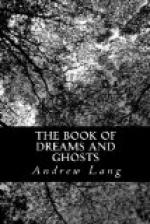Sleeping is as natural as waking; dreams are nearly as frequent as every-day sensations, thoughts, and emotions. But dreams, being familiar, are credible; it is admitted that people do dream; we reach the less credible as we advance to the less familiar. For, if we think for a moment, the alleged events of ghostdom—apparitions of all sorts—are precisely identical with the every-night phenomena of dreaming, except for the avowed element of sleep in dreams.
In dreams, time and space are annihilated, and two severed lovers may be made happy. In dreams, amidst a grotesque confusion of things remembered and things forgot, we see the events of the past (I have been at Culloden fight and at the siege of Troy); we are present in places remote; we behold the absent; we converse with the dead, and we may even (let us say by chance coincidence) forecast the future. All these things, except the last, are familiar to everybody who dreams. It is also certain that similar, but yet more vivid, false experiences may be produced, at the word of the hypnotiser, in persons under the hypnotic sleep. A hypnotised man will take water for wine, and get drunk on it.
Now, the ghostly is nothing but the experience, when men are awake, or apparently awake, of the every-night phenomena of dreaming. The vision of the absent seen by a waking, or apparently waking, man is called “a wraith”; the waking, or apparently waking, vision of the dead is called “a ghost”. Yet, as St. Augustine says, the absent man, or the dead man, may know no more of the vision, and may have no more to do with causing it, than have the absent or the dead whom we are perfectly accustomed to see in our dreams. Moreover, the comparatively rare cases in which two or more waking people are alleged to have seen the same “ghost,” simultaneously or in succession, have their parallel in sleep, where two or more persons simultaneously dream the same dream. Of this curious fact let us give one example: the names only are altered.
THE DOG FANTI
Mrs. Ogilvie of Drumquaigh had a poodle named Fanti. Her family, or at least those who lived with her, were her son, the laird, and three daughters. Of these the two younger, at a certain recent date, were paying a short visit to a neighbouring country house. Mrs. Ogilvie was accustomed to breakfast in her bedroom, not being in the best of health. One morning Miss Ogilvie came down to breakfast and said to her brother, “I had an odd dream; I dreamed Fanti went mad”.
“Well, that is odd,” said her brother. “So did I. We had better not tell mother; it might make her nervous.”
Miss Ogilvie went up after breakfast to see the elder lady, who said, “Do turn out Fanti; I dreamed last night that he went mad and bit”.
In the afternoon the two younger sisters came home.
“How did you enjoy yourselves?” one of the others asked.




